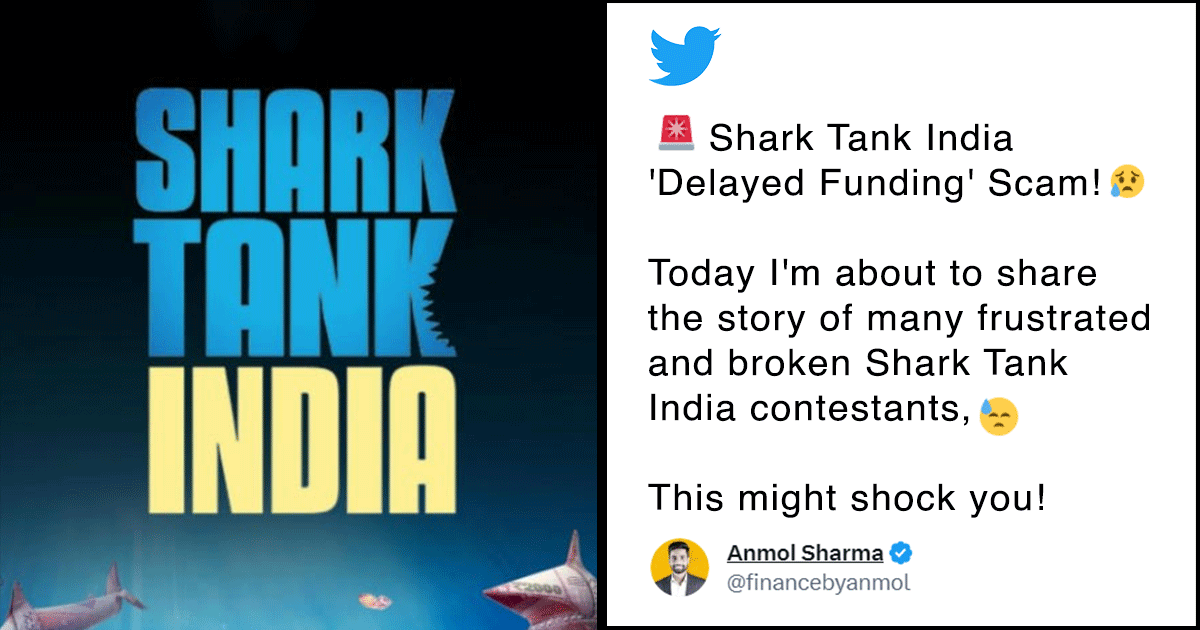Is Shark Tank Just Another TV Show That Scams The Entrepreneurs?
Is Shark Tank Just A Drama TV Show? Because it seems like that it's exploiting the participants to gain views and money.
Is Shark Tank Just A Drama TV Show? Because it seems like that it’s exploiting the participants to gain views and money.
Over the past two years, Shark Tank India has gained immense popularity, becoming a favorite show among audiences. Viewers eagerly anticipate the show’s airing to witness new entrepreneurs presenting their innovative ideas and pitches. However, there have been claims that Shark Tank India is as scripted as any other drama show. Participants have shared quotes stating that they were promised investments on the show but were never contacted by the Sharks’ team afterward. These allegations suggest that some participants may have been utilized solely to increase television ratings, rather than genuinely supporting their businesses.
The initial two seasons of Shark Tank India were resounding successes nationwide. In the first season, the “Sharks” (judges) invested Rs 42 crore in 67 local businesses. According to a report, the second season witnessed investments of approximately Rs 80 crore in startups. But the main question is if the startups aren’t receiving the funding then are these stats just shared to showcase the show’s credibility? Because there have been instances where startup founders on Shark Tank India claimed to have been promised investments on the show but never actually received them.

This raises questions about the authenticity of the investments and the overall experience for the participating startups. Aspiring entrepreneurs may wonder if it is truly worthwhile to go on the show and pitch their businesses, considering the potential discrepancies between what is promised during the televised episode and the actual outcome.
A Participant Who Shared The Dark Secret;
One founder who appeared on Shark Tank India shared a disheartening account of their experience on the show. According to this founder, participants pitching their businesses are subjected to harsh mockery, disrespect, and ridicule. Even if a business manages to secure funding from one of the sharks, they are informed that they must wait for a lengthy period of 9-12 months due to procedural reasons.
Let’s Understand The Timeline Of The Process;
The show’s timeline exacerbates the frustration, with pitches taking place between August and November, while the episodes are not aired until January to March. Because the sharks wait for the episode to air. As they closely monitor the business’s sales, visibility, and any potential interest from other investors. The opportunity for an entrepreneur’s pitch to be featured on the show seems to be contingent upon the brand’s pre-existing recognition or becoming a subject of humiliation and mockery.
The process doesn’t end here, then it involves the participant in a cumbersome paperwork procedure, which ultimately proves to be misleading for business owners who were eagerly awaiting the promised funds. These procedures seem like they want the business owner to get frustrated and get rid of taking the funds. At the end of it all, the sharks simply disappear, neither contacting the participant nor allowing any contact from their side.
This pattern is not unique to Shark Tank India, as it seems to have been copied from its US counterpart. In fact, around 60% of deals made on Shark Tank US do not reach completion, so it is not surprising if Shark Tank India also rejects deals for trivial reasons.

Considering these circumstances, the credibility of the show itself comes into question. SONY TV, the broadcasting channel, does not provide any support in such situations, as their primary concern is generating high television ratings (TRP), rather than ensuring the well-being of the participants.
What comes to conclusion is that it’s a disheartening reality about Shark Tank India, where participants face mockery and disrespect, experience lengthy delays in receiving funds, encounter misleading paperwork procedures, and ultimately get ghosted by the sharks.
During this time, they delay the funding closure by asking for more paperwork + ghosting the founders using different excuses.

The show isn’t just about TRP but the judges of Shark Tank India also gained significant popularity throughout the seasons. In Season 1, the judges included Ashneer Grover, Namita Thapar, Aman Gupta, Anupam Mittal, Vineeta Singh, Peyush Bansal, and Gazal Alagh. However, in Season 2, Ashneer Grover was not part of the cast, which caused disappointment among the audience and reportedly impacted the show’s TRP.
One may wonder how these business owners became “sharks” and were given the authority to decide which businesses or startups can be profitable, considering that their own companies have experienced losses.

Let’s take a closer look at the financial performances of these companies:
- Vineeta Singh‘s SUGAR Cosmetics reported a loss of INR 75 crore in FY22, up from INR 21.1 crore in FY21.
- Ghazal Alagh’s Mamaearth, after suffering losses of INR 1,332 crore in FY21 and INR 428 crore in FY20, posted a profit of INR 14.44 crore in FY22. The company has recently begun turning profitable and is reportedly planning to go for an IPO with a valuation of INR 24,000 crore.
- BharatPe recorded a total loss of INR5,594 crore in FY22, following a loss of INR 2,961 crore in FY21. Ashneer Grover, who was removed from the company in 2022, was also leading the company during FY22.
- Anupam Mittal owns brands like Shaadi.com, Makaan.com, and Mauj Mobile. While there is limited information available about the financials of his other brands, Shaadi.com’s financials are not publicly known, except for recent reports about a potential IPO.
- Peyush Bansal’s Lenskart posted a consolidated loss of INR 102.3 crore in FY22.
- Namita Thapar is not the founder of her company Emcure Pharma; it was started by her father, who is still the CEO. There is minimal information available about the financial performance of Emcure Pharma’s other brands.
- Amit Jain’s CarDekho recorded losses of INR 246.5 crore in the financial year 2021-22.
- Aman Gupta’s Boat is the only company among the judges’ businesses that has been consistently profitable since its inception.

Hereby, we land up to a question: Is it fair to the Small Business owners who put a lot of effort and time to get to the show and end up getting disrespected and treated as a tool for TRP?Is it just a drama show like any other?





